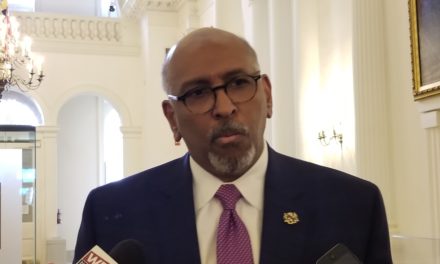By Andy Rosen
Andy@MarylandReporter.com
Lawmakers are seriously considering a $30 million reduction to Baltimore City’s share of the state aid that local jurisdictions share for road maintenance.
But city legislators are prepared to fight the staff proposal to redistribute that money to the state’s 23 other jurisdictions. Analysts say the move would more evenly distribute the money, which comes from gasoline, vehicle registration and titling taxes categorized as “highway user revenues.”
Local governments have taken a hit across the board, as the state kept most of the highway revenues that it usually sends to counties in order to balance the state budget.
A cut to all the counties taken in this year’s budget is set to be extended into next year, which will allow the state to save $340 million by keeping 95 percent of the revenues set aside for local roads. The state has previously kept closer to 70 percent of the total highway user revenue, which counties are supposed to use for transportation.
Baltimore City kicks in about 24 percent of the cost of its own road maintenance, according to a Department of Legislative Services analysis, while the counties pay about 54 percent of their own costs.
For decades, Baltimore’s highway funding has been treated differently in a unique arrangement in which the city takes care of essentially all of the roads within its borders. The State Highway Administration maintains state highways in the other counties.
At one time the city got 15 percent of the total local aid, that number now tops out at around 13 percent depending on total revenue. Next year Baltimore would get more than all the other counties combined.
As the Senate prepares to begin making decisions on the state budget next week, there’s a distinct possibility that lawmakers will look to move some of the highway money. That could be a tougher sell in the House, though. The $30 million proposed cut would leave Baltimore with about $100 million in highway user money, after it already lost $63 million from the overall cuts in that funding.
“This cut is pretty draconian,” said Sen. Nathaniel McFadden, a city Democrat on the budget committee.
Sen. James “Ed” DeGrange, D-Anne Arundel, chairman of the Senate transportation budget subcommittee, said he thinks the proposed cut deserves a close look.
“That’s certainly one of the options we’re looking at,” he said. “It’s very possible that the recommendation could be enacted.”
Republicans in the House have called for an even larger cut, leaving Baltimore City with just $30 million. But city lawmakers are pushing back.
Sen. Verna Jones, D-Baltimore City, has publicly wondered on several occasions what it would cost for Maryland to take over the state roads in Baltimore.
“I think that might be an option, and I don’t think the state’s going to want to assume that responsibility because of the cost,” said House Majority Whip Talmadge Branch, D-Baltimore City. He sits on the house subcommittee that will review highway budgets, and is pushing for the city to keep its share of the cash.
The city plays by different rules when it comes to spending the highway user revenues. It has more flexibility about what it can use the money for, but also keeps closer tabs on what it spends than many counties.
For instance, Baltimore spends some of the money on school transportation and park services. But Del. Tawanna Gaines, who heads the House subcommittee that covers transportation spending, points out that other counties don’t have to explain their spending. They only have to attest that they used the money for transportation costs.
According to a Department of Legislative Services analysis, local governments are spending much more than they are receiving from the state. The program encourages jurisdictions to kick in their own cash.
In 2009, the state paid out $465 million in highway funds, and local governments spent a total of $844 million including state money.
Gaines pointed out that the city has many nonprofit and educational institutions in its borders, which play an economic development role throughout the state, and she noted that Baltimore has already taken a sizable cut.
She said she’s been meeting with local government leaders to try to figure out how to deal with the suggestion.
“For me, it came out of clear blue sky,” Gaines said.





Recent Comments